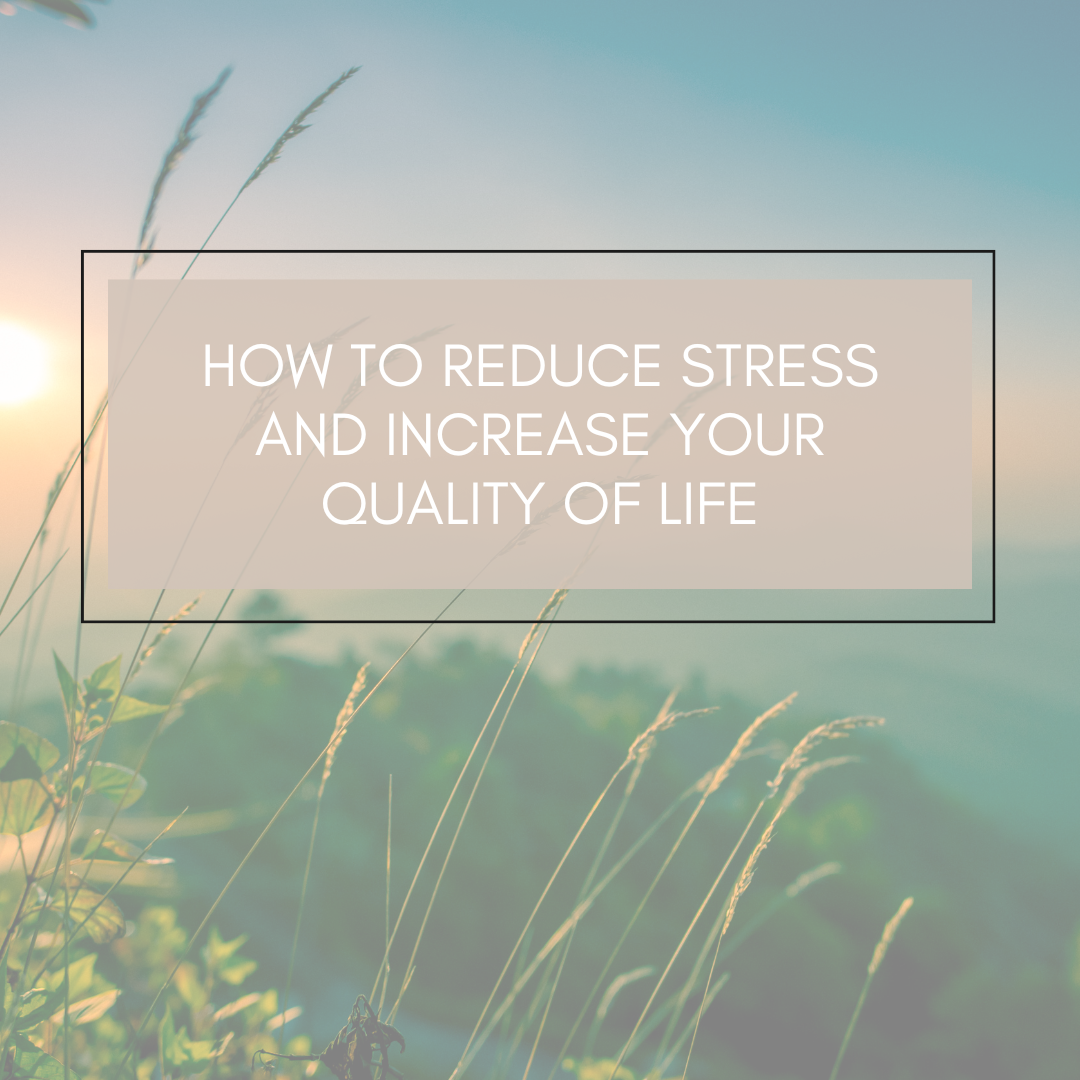Stress is a vital function that makes us ready to “fight or flight”, in a life-threatening situation. Originally, it was about fighting, or running away from, a predator, such as a bear or a saber-toothed tiger. In this article I’ll give you my best tips on how to reduce stress and increase your quality of life.
Short-term stress makes us sharp and able to get out of a dangerous situation, such as jumping out of the way of a car or meeting a deadline. Short-term stress is not harmful and we recover quickly afterwards. It is the long-term stress that occurs in our lives due to, for example, financial problems, relationship problems, work-related problems, feelings of anxiety over our performance or looks, and many other things that we are exposed to in our daily lives.
These are not life-threatening problems, but they can be if they persist for a long time.
In today’s society, we stress over things that are often completely harmless and certainly not life-threatening.
An experience changes our biochemistry!
What happens is that we experience (see, hear, feel) something that we perceive as stressful, for example we see the bus approaching, the boss says something negative to us, we can’t afford to pay the rent, we have a deadline or something else that the individual perceives as stressful.
What happens in the body?
- The brain sends signals to the adrenal glands, which secrete the stress hormones adrenaline and cortisol. They make the body prepare physiologically to be able to get out of the situation.
- The muscles and liver release glucose into the blood from glycogen storage to provide energy for the brain.
- Vital functions, which are not vital for the moment, such as gastrointestinal processes (for example digestion), the immune system, healing and repair of cells, stop to conserve energy for a possible escape or defense.
- Calcium is mobilized in the blood to assist in coagulation if an injury occurs.
The body is getting ready to fight or flight!
It is not difficult to understand that this is harmful if it is allowed to continue for a long time.
How stress affects skin health
Stress can affect skin health in many ways, some ways directly and some ways indirectly through other mechanisms, as explained below.
- One of the most important effects is that it prevents you from living a healthy lifestyle. There are some indirect effects of stress on skin health. When we’re stressed out, we tend to eat something unhealthy. Many people also drink alcohol to reduce stress and anxious feelings.
- When you’re stressed your sleep is affected.
- Stress can affect your microbiome. There’s a direct link between the gut and the skin via the gut-skin-connection.
- Long term, and chronic, stress increases inflammation. There’s a strong connection between stress and psoriasis.
- Stress can increase the need and use of certain vitamins and minerals, such as vitamin C, certain B-vitamins and omega-3-fatty acids – all of which are important for maintaining skin health.

Learn how to reduce stress and increase your quality of life
Society looks the way it does and unfortunately we can’t do anything about it. What we can do is learn to manage our experience of it, and our approach to it, in the best way possible, to reduce the burden of stress in our lives, to feel as good as possible.
I am by no means a psychologist or therapist, but I have experienced stress in many different forms (for example, job stress, worry about a sick child, performance demands), for long periods of time, and want to share what I learned from it.
The following tips are a summary of my knowledge through working with health as a nutritionist in combination with my own life experience and I hope they can help you reduce your stress and increase your quality of life!
Wind down to relax and recover
We often talked about how important it is to slow down to balance the stress in life. Examples of winding down are walking in nature, reading a book, a relaxing yoga session (for example medicinal yoga), engaging in mindfulness or meditation, listening to music, cuddling with a pet or anything else that gives you peace.
There are many books on the topic of mindfulness and reading such a book can in itself bring peace. Watching a series on a streaming service can feel nice and relaxing, but it doesn’t provide the deep relaxation needed because the brain is in constant stimulation. It can certainly be valuable for relaxing for a while, it can help to get you to sit down and rest for a while, but feel free to do other activities that really slow you down.
Winding down is incredibly important, but it’s not enough to reduce stress in life. Much more is needed to reduce stress, such as being able to handle stressful situations that arise in life, see below.
Become an expert in dealing with situations that cause stress in your life
Learn to deal with stressful situations in the moment as they arise, for example using tools used within cognitive behavioral therapy (CBT). Identify the factors that stress you and prepare how to deal with them.
One example is being more forgiving and accepting in situations that you cannot control or if you were to be late or receive criticism from someone. These are examples of situations that most people get stressed about and you can benefit from having a more relaxed approach to these situations for example by thinking:
“Oh, now I’m going to be late but it’s what it is, I’m always on time otherwise and it doesn’t change anything if I get stressed about it”
or
“I know I did my best so I don’t care what Bob thinks about it”.
This is very hard, I know, but important!!
In CBT, it is about learning that feelings of anxiety that arise are not dangerous, but pass after a while. It can be very stressful and cause very strong anxious feelings, to be late or to receive criticism, but the anxiety itself is not dangerous.
Over time, it becomes easier to manage and overcome anxiety that arises in these types of situations.
Avoid chemical stressors that burden the body
Reduce or avoid stimulants that stress you, such as too much caffeine, sugar, alcohol and energy drinks. Replace a few cups of coffee with decaffeinated tea, such as red tea or herbal tea (especially in the afternoon for better sleep). My tip is to not drink any coffee after 12am (I drink 2 cups before 9 am, any more or any later and I feel super stressed and I can’t sleep in the evening).
Alcohol can seem relaxing in the moment but is a stressor for the body. A small amount of alcohol increases the release of GABA, a calming brain chemical (neurotransmitter). In contrast, a lot of alcohol decreases GABA and increases anxiety.
This is a bit personal, but it if helps just one person, it’s worth sharing! I used to drink alcohol to reduce feelings of stress and anxiety, but decided to completely cut out alcohol from my life. It’s the best decision I’ve ever made in my life! Now, I do other things to relax, for example running, yoga, going for a walk in nature, writing my journal or any other activity that reduces stress and at the same time, increases my quality of life! If you usually use alcohol to relax, it is important to review your approach to alcohol and if you have a risky behavior when it comes to alcohol.

Realistic planning and time management
Learn to prevent stressful situations, for example by having a realistic schedule and good planning with reminders. Writing down activities and appointments in a calendar means you don’t have to try to remember them by keeping them in your head. Set alarms and reminders in your mobile to make sure you remember important things.
If you’re going to meet someone at a certain time, it’s worth planning when you need to do what you need to do to make it there on time. One tip is to count backwards to get an idea of how much time you need, for example:
- 6.00 pm – arrive at Tina’s
- 5.30 pm – leave home
- 5.00 pm – make-up and change clothes
- 4.30 pm – shower
In this example, you need to be in the shower at 4.30pm to follow your schedule and not have to stress.
Have realistic expectations of yourself
Work on your self-image to have realistic expectations of yourself. Often our performance requirements are about what we expect of ourselves and they can sometimes be completely unreasonable and we would never make these demands on our colleagues, friends or family. Your colleague or friend probably has a completely normal and realistic expectation of your performance, try to see yourself from their eyes.
If you see that their performance demands on you are completely unreasonable, dare to speak up. Be kind to yourself and learn to realize your worth, you are at least as valuable as any other person and are not expected to perform more than others in the same situation as you.
You are the most important person in your life!
Ignore unimportant things that steal your energy and time
Try to lower the bar on your own requirements for really UNIMPORTANT things like cleaning, decorating a dinner table at a gathering and the like, it really doesn’t have to be PERFECT.
Think about what is really worth spending time and energy on. The experience is guaranteed to be better for everyone if you stress less before, for example, a dinner with your friends or on Christmas dinner, and instead are present and happy at the event itself.
It can be very nice for others if it’s not perfect, so by having the right attitude about this, you can help your loved ones reduce stress, performance demands and high expectations, as well.
Prioritize creating a sustainable living situation
Review your entire life situation! What is it that stresses you out? Do you need to change jobs, home or partners? How much is a stressful job worth, really? Living in an unsustainable life situation can be harmful to health, in the long run, due to an increased stress over a long period of time.
Of course, it is not always easy to simply change jobs or homes, but it can be incredibly important and should be prioritized if your life situation is unsustainable. An example of a situation like this is an unsustainable relationship where children are involved. It may feel like there is no other option but to stay in the relationship for the children’s sake, but it really isn’t always best for the children if the parents stay together in a bad relationship. This can be very difficult, but important, and it’s a good idea to get help from a professional therapist in these types of situations.
Remove energy thieves
Don’t meet friends who take more energy than they give!! Learn to sense and sort through your social contacts and activities. See those friends you WANT to meet and avoid those who do not bring you joy and energy.
Of course, you may need to be there for a friend who needs help and support for a period, without it giving you energy. But it needs to be reasonable for you and it is important that you are not taken advantage of.
Learn the art of acceptance
Learning acceptance is incredibly valuable in order to live a harmonious life. The method Acceptance and commitment therapy (ACT) is about identifying stressful situations and either changing them (for example, ending a relationship that affects you negatively) or accepting them (for example, accepting your otherwise nice partner’s shortcomings that are really unimportant but that annoys you a little bit).
Accepting bad situations is not about giving up, it’s about accepting what you can’t do anything about, in order to have a good quality of life.
I recommend the book “The Happiness Trap – How to stop struggling and start living” by Russ Harris. It can help gain perspective on life and provide important tools to be able to handle various difficult life situations through the ACT method.
Don’t help TOO MUCH
Learn to say NO to activities that make it too much for you. You don’t have to sit on the board of the housing estate association and the sports association, be a class parent, hang out with people you don’t get anything in return from, be there for – and help – everyone all the time, and other things that steal time and energy. Of course you need to help and stand up sometimes, it’s part of being human, but it needs to be REASONABLE for you! Don’t say YES to everything, but be kind and realistic to yourself.
What can you do now?
All this can be difficult but so important to reduce the risk of you suffering from diseases linked to stress, but above all and at least as important, to have a good life.
Follow these steps to map out and make a plan on how to reduce stress and increase your quality of life:
- What you can start with is to reflect on what stresses you have in your life and what your life situation looks like.
- Think actively about what you can reduce and what changes you can make, to improve your life situation.
- What do you need to learn to accept?
- Write down in a diary or on a piece of paper to make it easier to remember and to be able to make a concrete plan.
- Get outside help where you feel you need it, for example speak to a close friend or family member, see a therapist (especially if there are children involved), a psychologist or maybe a doctor.
- Read more, and learn about tricks and techniques that you feel can help you to cope and to move forward, such as mindfulness or acceptance.
It is of course important to take care of your body and health in general by eating a good diet, sleeping and exercising. A healthy and strong body is more resilient towards stress.
I wish you good luck and take care!

